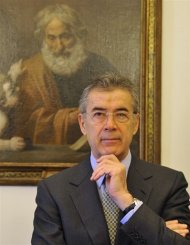Mario Resca is at it again. Resca is the corporate executive, the former president of McDonald’s Italy, whose late 2008 appointment as a cultural official charged with transforming many of Italy’s cultural treasures was met with a 7,000-signature protest.
 So much for all that. As Resca has shown, in an interview with the Wall Street Journal printed last January, for example, he has ideas worth considering. Now, The Art Newspaper has obtained an interview, and Resca took the opportunity to elaborate on some parts of his plans for Italy’s cultural sites. And though he said he has won over some of his critics, he also tweaked them, rightly so, saying:
So much for all that. As Resca has shown, in an interview with the Wall Street Journal printed last January, for example, he has ideas worth considering. Now, The Art Newspaper has obtained an interview, and Resca took the opportunity to elaborate on some parts of his plans for Italy’s cultural sites. And though he said he has won over some of his critics, he also tweaked them, rightly so, saying:
“Many of our great museums do not have an up-to-date catalogue or inventory of their collections….where have our high priests and vestal virgins of culture been for the past 20 years? Why have they not reported the misappropriation, the state of neglect, the lack of any protective measures and the chronic underfunding?”
The article is not online, so you’ll have to buy the October issue of the paper to see the whole thing.
Here are a few key points:
- Come January, he’ll have control of about 40 million Euros, allowing him to start totally redeveloping the Pinacoteca and Accademia di Brera in Milan.
- He plans to introduce a tax law to encourage donations to museum, instead of penalizing them.
- He wants to decentralize authority, letting museum directors actually manage their institutions — and he’ll “rationalize” them, as too many draw very few visitors.
- Recognizing his lack of art/museum expertise, he’ll appoint three experts, one each in archaeology, in classic/modern art, and in contemporary art, to help him reverse the decline in visitorship and other troublesome trends.
Resca said he’d just returned to Rome from the U.S., where he had accompanied the Beffi Triptych to the National Gallery of Art for an exhibit and, later, met with Thomas Campbell, head of the Metropolitan Museum. That gave him an opening for signaling he wished to lend art: He praised the interest in Italian culture abroad “which is why the works much be exhibited abroad: they are our best ambassadors.” Does that mean higher fees? Maybe, but who isn’t exacting stiff prices for art loans these days?
A few questions notwithstanding, Resca may turn out to be a good thing for art.
